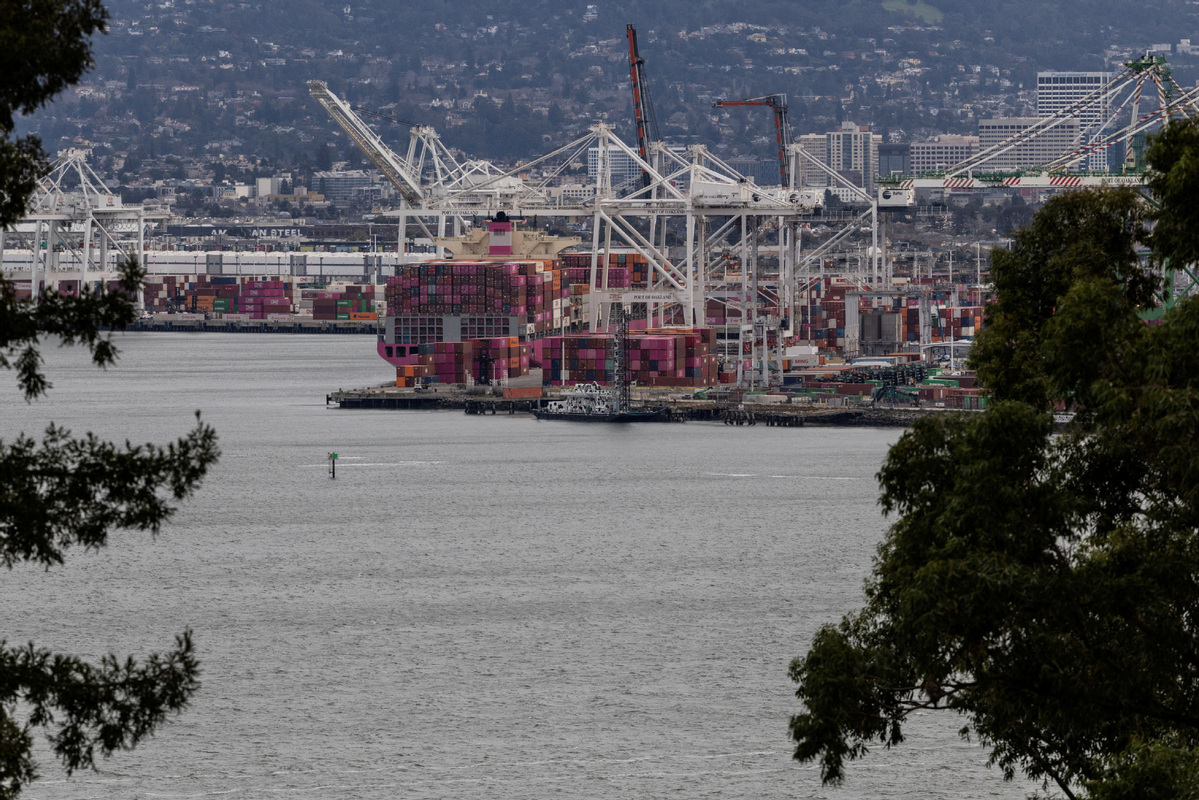美国的关税战让所有人都输了 - 2025-02-11

A cargo ship full of shipping containers is seen at the port of Oakland in Oakland, California, US, Feb 3, 2025.
US President Donald Trump, during a meeting with visiting Japanese Prime Minister Shigeru Ishiba last Friday, announced plans to impose reciprocal tariffs on multiple countries next week, escalating the risk of a global trade war. In today's era of global interconnectedness and economic interdependence, the tariff wars initiated by the US threaten to disrupt international commerce and sow the seeds of discord among countries.
Driven by a combination of economic concerns, political strategy, and ideological beliefs, Trump has once again embraced tariffs as the means to address perceived trade imbalances, protect US industries, and extort concessions from trading partners.
On his inauguration for his second term in office, the White House issued Trump's "America First Trade Policy" memo, saying: "I am establishing a robust and reinvigorated trade policy that promotes investment and productivity, enhances our nation's industrial and technological advantages, defends our economic and national security, and above all benefits American workers, manufacturers, farmers, ranchers, entrepreneurs and businesses."
But the reality is that any trade war is a double-edged sword. While such rhetoric resonates with his political base, particularly in areas of the US that have experienced the loss of manufacturing jobs as a result of globalization, the tariff wars his administration is waging will not achieve those aims.
The US tariff policies have triggered a surge in global trade protectionism. The potential consequences include reduced productivity, higher costs for businesses, and slower economic growth. As Mary Lovely, a senior fellow at the Peterson Institute for International Economics, said, they are a huge gamble, and "a recipe for slowing down the economy and increasing inflation".
The tariff battles will produce no winners and will not achieve the desired effects for the US. While tariffs might offer protection for specific industries and address trade imbalances in the short term, they fail to promote long-term investment and productivity. Retaliatory tariffs from trading partners can harm export-dependent manufacturing industries and agriculture, putting jobs at risk. Moreover, trade wars erode trust with trading partners, potentially leading to retaliatory measures that harm the US defense sector's industrial base and disruptions to global supply chains on which many US defense and technology industries rely.
Tariffs are a crude and simple weapon of the Trump administration's beggar-thy-neighbor economic nationalism that aims to reinforce US primacy. But the notion of a winner in a trade war is a fallacy, as the destructive ripple effects of protectionist measures spread far beyond the immediate participants, inflicting harm on economies, businesses, and consumers around the globe.
The uncertainty surrounding US diplomatic and economic policies is having an increasingly significant impact on the global economy and international relations. Trump's trade policies contribute to the complexity and instability of the global economic landscape. This uncertainty makes it difficult for businesses to plan and invest, further dampening economic growth. They are especially harmful to small and medium-sized businesses.
China is fully aware of the damaging consequences of trade wars. But the US administration has left it with no choice but to respond with countermeasures. It will not submit to external pressure.
Given the fact that many countries are struggling to recover their economic growth, what the Trump administration is doing will cast a pall on the prospect of the development of the world economy.
By standing up to the US and imposing carefully targeted countermeasures, China is not only showing that it will not be bullied but also demonstrating that it is a staunch defender of free trade and globalization. China is ready and willing to strengthen its relationships with other countries to oppose the US' harmful unilateralism.
Beijing urges the Trump administration to engage in dialogue. Rather than resorting to adversarial tactics, nations should engage in talks and seek mutual understanding to resolve trade disputes and foster inclusive growth. Cooperation and collaboration are essential to address the complex challenges facing the global economy and to ensure a more stable and prosperous future for all.
Source: China Daily
